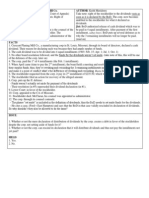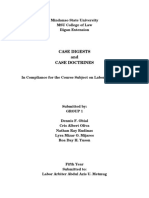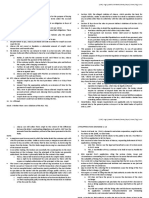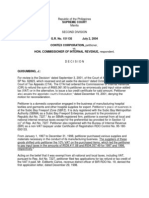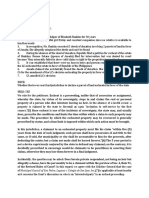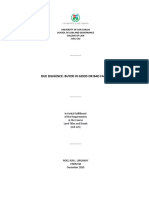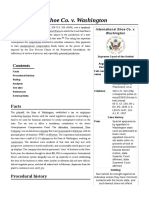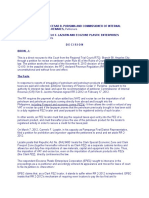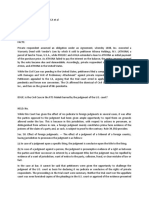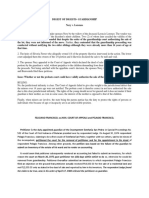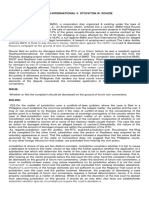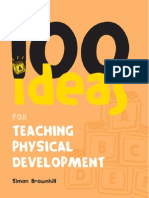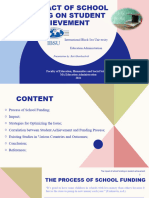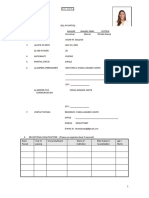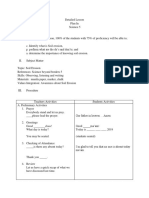Regino v. Pangasinan Colleges of Science and Technology
Regino v. Pangasinan Colleges of Science and Technology
Uploaded by
JG UdCopyright:
Available Formats
Regino v. Pangasinan Colleges of Science and Technology
Regino v. Pangasinan Colleges of Science and Technology
Uploaded by
JG UdOriginal Title
Copyright
Available Formats
Share this document
Did you find this document useful?
Is this content inappropriate?
Copyright:
Available Formats
Regino v. Pangasinan Colleges of Science and Technology
Regino v. Pangasinan Colleges of Science and Technology
Uploaded by
JG UdCopyright:
Available Formats
Administrative Law
regino
v.
pangasinan
colleges of science and
technology
facts
Petitioner
Khristine
Rea
M.
Regino
was
a
first
year
computer science student at the
respondent-school,
Pangasinan
Colleges
of
Science
and
Technology (PCST) where she was
enrolled, with a part of her
curriculum being a logic and
statistics
subjects
under
the
respondents,
Rachelle
A.
Gamurot and Elissa Baladad. In the
second semester of her school
year, PCST held a fund raising
activity wherein the students were
indirectly required to purchase
tickets for the event for P100.00,
with additional points in their test
scores being the incentive. Those
who failed to avail of the tickets,
however, would be disallowed from
taking their final examinations.
Financially strapped and prohibited
by her religion from attending
dance parties and celebrations,
Regino refused to pay for the
tickets, which led her to be
excluded from the rest of her class
in taking the final examinations
and outright ejected from their
classroom the following day after
publicly naming her and one other
classmate as persons who did not
purchase tickets. Despite their
pleas, the respondents remained
adamant that they were simply
following PCSTs school policy.
Aggrieved, the petitioners went to
the trial court and filed, as pauper
Prior Resort
litigant, a case against the
respondents and the PCST. The trial
court, however, ruled in favor of
the respondents and dismissed the
case due to the non-exhaustion of
administrative remedies, citing that
the question raised in the case
involved the determination of the
wisdom of an administrative policy
of PCST. Hence, the case should
have been initiated before the
proper administrative body, the
Commission of Higher Education
(CHED), which has the power of
supervision and regulation of
tertiary schools under Section 54 of
RA 7722, the Education Act of
1982.
issue
Is the doctrine of exhaustion of
administrative
remedies
is
applicable?
held
No. The respondents anchored
their Motion to Dismiss on
petitioners
alleged
failure
to
exhaust administrative remedies
before resorting to the RTC.
According
to
them,
the
determination of the controversy
hinge on the validity, the wisdom
and the propriety of PCSTs
academic policy. However, the
doctrine
of
exhaustion
of
administrative remedies does not
apply to the present case.
The doctrine of exhaustion of
administrative
remedies
(Prior
Resort) states that courts should
not entertain suits unless the
available administrative remedies
have first been resorted to and the
Administrative Law
Prior Resort
proper authorities have been given
the appropriate opportunity to act
and correct their alleged errors, if
any,
committed
in
the
administrative forum. It admits to
certain exceptions, one of which
arises when the issue is purely
legal
and
well
within
the
jurisdiction of the trial court such
as in the present case at bar.
damages; a power beyond the
administrative agency to grant
since it is not a court. Since the
petitioner, at this time, is asking for
damages, the same calls for the
interpretation of the Civil Code; a
function that falls squarely within
the ambit of the courts. As such,
the exhaustion of administrative
remedies cannot bar the petitioner.
In this case, Regino is not asking
for the reversal of the policies of
PCST and neither is she demanding
it to allow her to take her final
examinations since she is already
enrolled in another educational
institution by the time of this
decision. In fact, even if she were
to file a case with CHED, her
request involves the awarding of
Note: Doctrine of Prior Resort/
Doctrine of Primary Administrative
Jurisdiction states that where there
is competence or jurisdiction
vested upon an administrative
body to act upon a matter, no
resort to the courts may be made
before such administrative body
shall have acted upon the matter.
You might also like
- Disability Support Services HandbookFrom EverandDisability Support Services HandbookNo ratings yet
- LD002Document44 pagesLD002Kori KuncoroNo ratings yet
- 06 Regino v. Pangasinan Colleges of Science and Technology, G.R. No.156109, November 18, 2004Document9 pages06 Regino v. Pangasinan Colleges of Science and Technology, G.R. No.156109, November 18, 2004Anonymous geq9k8oQyONo ratings yet
- Case Digest (20180605)Document17 pagesCase Digest (20180605)francoise cantaraNo ratings yet
- Sps Pacquiao Vs CTA DigestDocument5 pagesSps Pacquiao Vs CTA Digestsally deeNo ratings yet
- Lezema Et Al Vs Rodriguez To Alvarez Vs RamirezDocument5 pagesLezema Et Al Vs Rodriguez To Alvarez Vs RamirezBenBulacNo ratings yet
- Sps Pereña V Sps ZarateDocument2 pagesSps Pereña V Sps ZarateEmilio PahinaNo ratings yet
- 06 Taylor v. Manila Electric, Railroad and Light Co., G.R. No. L-4977, 22 March 1910Document10 pages06 Taylor v. Manila Electric, Railroad and Light Co., G.R. No. L-4977, 22 March 1910Andrei Da JoseNo ratings yet
- Swedish Match Philippines, Inc., Petitioner, vs. The Treasurer of The City of ManilaDocument2 pagesSwedish Match Philippines, Inc., Petitioner, vs. The Treasurer of The City of ManilaRenz AmonNo ratings yet
- Roxas v. CADocument2 pagesRoxas v. CA111111No ratings yet
- Calde v. Ca - PDF ScraDocument10 pagesCalde v. Ca - PDF ScraMariline LeeNo ratings yet
- Tayag v. Tayag-GallorDocument2 pagesTayag v. Tayag-GallorJames Ibrahim AlihNo ratings yet
- (SPIT) (Lizarraga Hermanos v. Abada) (Francisco)Document2 pages(SPIT) (Lizarraga Hermanos v. Abada) (Francisco)sin100% (1)
- Echavez v. Dozen Construction PDFDocument3 pagesEchavez v. Dozen Construction PDFCathy BelgiraNo ratings yet
- DBM Vs MAnila's FinestDocument6 pagesDBM Vs MAnila's FinestVince Llamazares LupangoNo ratings yet
- UE Vs Jader (Persons)Document8 pagesUE Vs Jader (Persons)MasterboleroNo ratings yet
- Naguiat V NLRCDocument17 pagesNaguiat V NLRCnia_artemis3414No ratings yet
- 201 McClaran V Crescent Planing Mill CoDocument2 pages201 McClaran V Crescent Planing Mill Cokeith105No ratings yet
- EMILIO GONZALEZ LA O, Plaintiff and Appellee, vs. THE YEK TONG LIN FIRE & MARINE INSURANCE Co., LTD., Defendant and Appellant.Document14 pagesEMILIO GONZALEZ LA O, Plaintiff and Appellee, vs. THE YEK TONG LIN FIRE & MARINE INSURANCE Co., LTD., Defendant and Appellant.ailynvdsNo ratings yet
- #1 Case DigestDocument5 pages#1 Case DigestShamcy GonzNo ratings yet
- SpecPro Rule 77Document13 pagesSpecPro Rule 77angelescrishanneNo ratings yet
- G.R. Nos. L-27425 & L-30505 - Converse Rubber Vs Jacinto RubberDocument8 pagesG.R. Nos. L-27425 & L-30505 - Converse Rubber Vs Jacinto RubberArmand Patiño AlforqueNo ratings yet
- SRC (Ceniza) PDFDocument23 pagesSRC (Ceniza) PDFWally Ann YumulNo ratings yet
- Datuin Vs CADocument5 pagesDatuin Vs CAbogoldoyNo ratings yet
- Contex Corp Vs CirDocument7 pagesContex Corp Vs Ciractuarial_researcherNo ratings yet
- SPECPRO REPUBLIC Vs CA and Soriano Vs LatonoDocument3 pagesSPECPRO REPUBLIC Vs CA and Soriano Vs LatonoJanette TitoNo ratings yet
- Custodio Vs CADocument12 pagesCustodio Vs CAmaicaNo ratings yet
- Philtrust Company Vs CADocument8 pagesPhiltrust Company Vs CAJeliza ManaligodNo ratings yet
- Motion For Execution - Mrc-JaboneteDocument2 pagesMotion For Execution - Mrc-JaboneteGalgs BorgeNo ratings yet
- Heirs of Maglasang V Manila Banking Corp - PeraltaDocument2 pagesHeirs of Maglasang V Manila Banking Corp - PeraltaTrixie PeraltaNo ratings yet
- GR CIR Vs Optical TransitionDocument9 pagesGR CIR Vs Optical TransitionJoey SulteNo ratings yet
- Linganay Due DiligenceDocument12 pagesLinganay Due DiligenceNJ LinNo ratings yet
- Dela Torre v. ImbuidoDocument3 pagesDela Torre v. ImbuidoMars TubalinalNo ratings yet
- Delta Ventures Vs Cabato - G.R. No. 118216. March 9, 2000Document6 pagesDelta Ventures Vs Cabato - G.R. No. 118216. March 9, 2000Ebbe DyNo ratings yet
- International Shoe Co. v. WashingtonDocument4 pagesInternational Shoe Co. v. WashingtonAnonymous SAQhi35No ratings yet
- Creba vs. RomuloDocument4 pagesCreba vs. RomuloJD BallosNo ratings yet
- 21.secretary Vs LazatinDocument11 pages21.secretary Vs LazatinClyde KitongNo ratings yet
- 09.spouses Buenaventura v. Court of Appeals, G.R. No. 126376, November 20, 2003Document8 pages09.spouses Buenaventura v. Court of Appeals, G.R. No. 126376, November 20, 2003HNo ratings yet
- Communication Materials Vs CADocument2 pagesCommunication Materials Vs CAJelyn Delos Reyes TagleNo ratings yet
- Plaintiff-Appellee Vs Vs Defendant-Appellant Frederick Garfield Waite Solicitor-General HarveyDocument4 pagesPlaintiff-Appellee Vs Vs Defendant-Appellant Frederick Garfield Waite Solicitor-General HarveyJustineNo ratings yet
- Special Power of Attorney - ScribdDocument2 pagesSpecial Power of Attorney - ScribdJoann LedesmaNo ratings yet
- CIR Vs Euro-Philippines Airline ServicesDocument10 pagesCIR Vs Euro-Philippines Airline ServicesBeltran KathNo ratings yet
- Fernandez Vs Dimagiba GR L-23638Document2 pagesFernandez Vs Dimagiba GR L-23638Tim PuertosNo ratings yet
- Dante Vicente VS MadajuconDocument2 pagesDante Vicente VS MadajuconLorenzo Angelo Acmor OcampoNo ratings yet
- Labrel - Case Digest - Art 285Document6 pagesLabrel - Case Digest - Art 285Roy DaguioNo ratings yet
- 9Document2 pages9Johnny Johnny Yes Papa SinsNo ratings yet
- Montealegre Vs Spouses de VeraDocument10 pagesMontealegre Vs Spouses de VeraFacio BoniNo ratings yet
- Corpo DigestDocument8 pagesCorpo DigestJillandroNo ratings yet
- Page 3 Syllabus Full Text W DigestDocument227 pagesPage 3 Syllabus Full Text W Digesttwenty19 lawNo ratings yet
- 17 Lanuza Vs BF CorpDocument30 pages17 Lanuza Vs BF CorpJanine RegaladoNo ratings yet
- Barredo V Garcia (Group1)Document1 pageBarredo V Garcia (Group1)Justin ParasNo ratings yet
- SP GuardianshipDocument23 pagesSP GuardianshipDia Mia BondiNo ratings yet
- PILIPINAS BANK Vs CA & Echaus, G.R. No. 97873 August 12, 1993Document9 pagesPILIPINAS BANK Vs CA & Echaus, G.R. No. 97873 August 12, 1993Pricelda Villa-BorreNo ratings yet
- PNB vs. Phil. LeatherDocument4 pagesPNB vs. Phil. LeatherRose Ann CalanglangNo ratings yet
- Union Bank v. SantibanezDocument5 pagesUnion Bank v. SantibanezHency TanbengcoNo ratings yet
- Raython International V. Stockton W. Rouzie FactsDocument9 pagesRaython International V. Stockton W. Rouzie FactsAnonymous P5eW9V3ANo ratings yet
- Maersk v. AlferosDocument8 pagesMaersk v. AlferosjsaintbarbsNo ratings yet
- Regino Versus Pangasin College of Science and TechnologyDocument1 pageRegino Versus Pangasin College of Science and TechnologyMarvien M. BarriosNo ratings yet
- Regino Vs Pangasinan Colleges of Science and TechnologyDocument2 pagesRegino Vs Pangasinan Colleges of Science and TechnologyRion MargateNo ratings yet
- Khristine Rea Regino v. Pangasinan Colleges of Science and Technology, Et Al, G.R. No. 156109, November 18, 2004Document16 pagesKhristine Rea Regino v. Pangasinan Colleges of Science and Technology, Et Al, G.R. No. 156109, November 18, 2004sunsetsailor85No ratings yet
- Regino Vs PCSTDocument10 pagesRegino Vs PCSTRemy BedañaNo ratings yet
- Baby Mall ActivityDocument12 pagesBaby Mall ActivityAaron HoodNo ratings yet
- (100 Ideas For The Early Years) Simon Brownhill-100 Ideas For Teaching Physical Development-Continuum International Publishing Group (2009)Document136 pages(100 Ideas For The Early Years) Simon Brownhill-100 Ideas For Teaching Physical Development-Continuum International Publishing Group (2009)mahmialter100% (1)
- The Impact of School Funding On Student AchievementDocument14 pagesThe Impact of School Funding On Student AchievementRati GharibashviliNo ratings yet
- Ingles PDFDocument194 pagesIngles PDFmarielaNo ratings yet
- Ccs Postings DetailDocument5 pagesCcs Postings DetailBrunoNo ratings yet
- Bio DataDocument3 pagesBio DataBarangay PangilNo ratings yet
- Virtual Orientation On The School-Based Feeding Program Operational Guidelines For SY 2020-2021Document11 pagesVirtual Orientation On The School-Based Feeding Program Operational Guidelines For SY 2020-2021Urmanita Nichole JHenNo ratings yet
- Lori Rusch - 5000 Mile Field TripDocument4 pagesLori Rusch - 5000 Mile Field TripClassroom 2.0 BookNo ratings yet
- m1 Stem FrameworkDocument2 pagesm1 Stem Frameworkapi-553392897No ratings yet
- Caregiving Grade 7 2109Document8 pagesCaregiving Grade 7 2109Josephine EnecuelaNo ratings yet
- Forms Child Development Checklist and Child Case Study 201Document7 pagesForms Child Development Checklist and Child Case Study 201api-301335627No ratings yet
- Module Information BookletDocument24 pagesModule Information BookletMarcus LiawNo ratings yet
- Ched Memorandum No. 17 - 2008Document3 pagesChed Memorandum No. 17 - 2008Agnes Francisco100% (1)
- SSD +immatrikulationsbescheinigung+ Englisch 2Document1 pageSSD +immatrikulationsbescheinigung+ Englisch 2Angela Pena LogreiraNo ratings yet
- Curriculum Guide SampleDocument4 pagesCurriculum Guide SampleRenz CruzNo ratings yet
- 13.categories That Effect The Consumer Buying Decision ProcessDocument20 pages13.categories That Effect The Consumer Buying Decision Processalmasy990% (1)
- School:: Last Name First Name Middle Name School AttendedDocument6 pagesSchool:: Last Name First Name Middle Name School AttendedScoopBoyNo ratings yet
- Dgca Car 147Document50 pagesDgca Car 147Vipin Chahal100% (1)
- Manovich 2017 Aesthetics Formalism and Media Studies PDFDocument4 pagesManovich 2017 Aesthetics Formalism and Media Studies PDFemalevaNo ratings yet
- Essay Test - Laila Rafida RofiDocument1 pageEssay Test - Laila Rafida RofiWahyu SaputraNo ratings yet
- Lesson Plan in ScienceDocument4 pagesLesson Plan in SciencedennNo ratings yet
- Applicants Record - 1564963335Document3 pagesApplicants Record - 1564963335Pros Mktg Nueva EcijaNo ratings yet
- 0520 s14 Ms 43 PDFDocument25 pages0520 s14 Ms 43 PDFlauranistNo ratings yet
- Prof. (DR.) U. C. Jha, M.Tech (IIT), PH.D (NIT), Around 23 Years ExpDocument2 pagesProf. (DR.) U. C. Jha, M.Tech (IIT), PH.D (NIT), Around 23 Years ExpFayzal KabirNo ratings yet
- Graduation 2017Document10 pagesGraduation 2017LansingStateJournalNo ratings yet
- Waste ManagementDocument8 pagesWaste ManagementGouri UnnikrishnanNo ratings yet
- Lesson Plan (News Break)Document1 pageLesson Plan (News Break)ejulanNo ratings yet
- Module 1 540 2021newDocument5 pagesModule 1 540 2021newapi-553174574No ratings yet
- MTH623 Quiz 1 BY AR Lucky TeamDocument12 pagesMTH623 Quiz 1 BY AR Lucky TeamKashf e AreejNo ratings yet

















